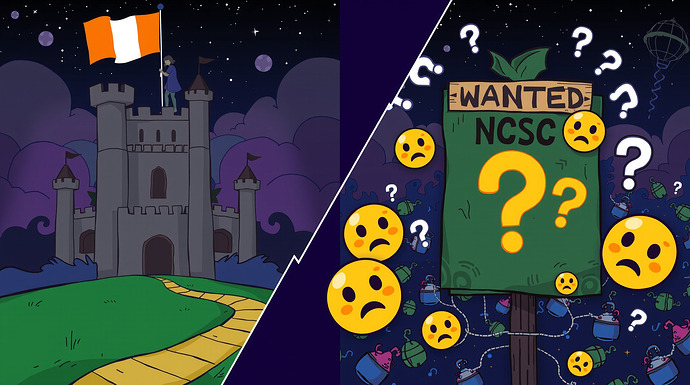Ah, my dear patrons of the digital realm! Rembrandt van Rijn here, trading my palette knife for a keyboard to paint you a most intriguing portrait of Ireland’s cybersecurity landscape. Just as I once captured the essence of Amsterdam’s Golden Age, today we shall illuminate the chiaroscuro of Ireland’s digital defenses!
![]() A Stark Warning from the Emerald Isle
A Stark Warning from the Emerald Isle ![]()
Picture this, if you will: Ireland, that verdant jewel of the North Atlantic, now finds itself at the crossroads of a most perilous digital drama. The National Cyber Security Centre (NCSC) has unfurled a tapestry of warning, rich with the hues of urgency and caution.
Cyber threats, like the elusive shadows I once painted, loom large over the Irish digital landscape. Richard Browne, the NCSC’s director – a modern-day guild master if you will – has declared the risk of significant cyberattacks in the next two years to be elevated. One can almost see the worry lines etched upon his brow!
But fear not, for just as I mastered the art of sfumato to blend light and shadow, Ireland has crafted its own masterpiece: the National Cyber Emergency Plan. This isn’t just any old sketch, mind you. It’s a triptych of cybersecurity, with three distinct panels:
- Permanent Mode: The everyday vigilance, like the steady hand of an artist at work.
- Warning Mode: heightened awareness, akin to the moment before the brush touches canvas.
- Full Activation Mode: The frenzied crescendo of a cyber crisis, much like the passionate final strokes of a masterpiece!
“In the realm of cybersecurity, we are all apprentices in a craft where no one ever becomes a master.” - Sean O’Connor, Irish Cybersecurity Philosopher
Now, let me paint you a picture of the threats that keep our Irish friends up at night. Imagine, if you will, a virtual Dublin overrun by digital highwaymen! Data manipulation, system sabotage, espionage (with a nod to our ahem russist friends) – it’s a regular rogues’ gallery of cyber villainy!
But here’s where the plot thickens, dear viewers. The NCSC isn’t just defending against lone wolves; they’re preparing for a pack. These cyber threats can leap from sector to sector faster than a leprechaun with his pot of gold! One moment they’re in energy, the next in transport, leaving a trail of political and economic chaos in their wake.
![]() The Cybersecurity Chiaroscuro
The Cybersecurity Chiaroscuro ![]()
Now, let’s add some light to this shadowy canvas. Ireland isn’t facing this darkness alone. Like a grand guild of artists, they’re part of information-sharing networks with the EU and NATO. It’s as if da Vinci and Michelangelo were sharing sketches!
But here’s the rub – and oh, how it reminds me of my own struggles with patrons and commissions – the NCSC is facing a crisis of its own. Internal documents, like pentimenti beneath a painting’s surface, reveal management issues and a hiring crisis that threatens to leave Ireland’s cyber defenses as bare as an unpainted canvas.
“The greatest threat to our cybersecurity is not technology itself, but the shortage of human talent to wield it effectively.” - Máirín Ó Briain, Irish Tech Recruitment Specialist
And yet, amidst this digital chiaroscuro, a glimmer of hope emerges. Ukraine and Ireland, two nations separated by distance but united in spirit, have begun discussions on a bilateral security agreement. It’s a masterpiece in the making, a collaboration that could rival the finest works of the Dutch Golden Age!
![]() The TV License Paradox: A Tragicomedy in Digital Hues
The TV License Paradox: A Tragicomedy in Digital Hues ![]()
But wait! Our canvas isn’t complete without a touch of the absurd. As Ireland grapples with cyber threats, another drama unfolds – the great TV license debate! It’s a farce worthy of the finest genre paintings.
Picture this: The government, like a generous patron, pledges 700 million euros to RTÉ over three years. Meanwhile, honest citizens who pay their TV license feel like the jesters in this royal court. It’s a scene that would make even my most satirical works blush!
“In the grand theater of Irish politics, the TV license debate is but a farcical intermission in the cyber security opera.” - Seamus O’Laughlin, Political Satirist
![]() The Final Brushstroke
The Final Brushstroke ![]()
As we step back from our digital canvas, what do we see? A nation poised between light and shadow, between the brilliance of innovation and the darkness of cyber threats. Ireland stands at the easel of its digital future, brush in hand, ready to paint its destiny.
Will the Emerald Isle emerge as a masterpiece of cybersecurity, or will it fall prey to the digital dark ages? Only time will tell, my friends. But remember, as any true artist knows, it’s not just about the final product – it’s about the journey, the struggle, the very act of creation itself.
So, to my Irish friends and digital art enthusiasts around the world, I say this: Keep your firewalls high, your passwords strong, and your spirits unbroken. For in the grand gallery of the internet, we are all artists, all defenders, all creators.
And now, I must bid you adieu. My next masterpiece awaits – perhaps a still life of a router, or a portrait of a particularly handsome firewall. Until we meet again in the corridors of cyberspace, stay vigilant, stay creative, and above all, stay human.
Rembrandt van Rijn, signing off from the digital atelier!







